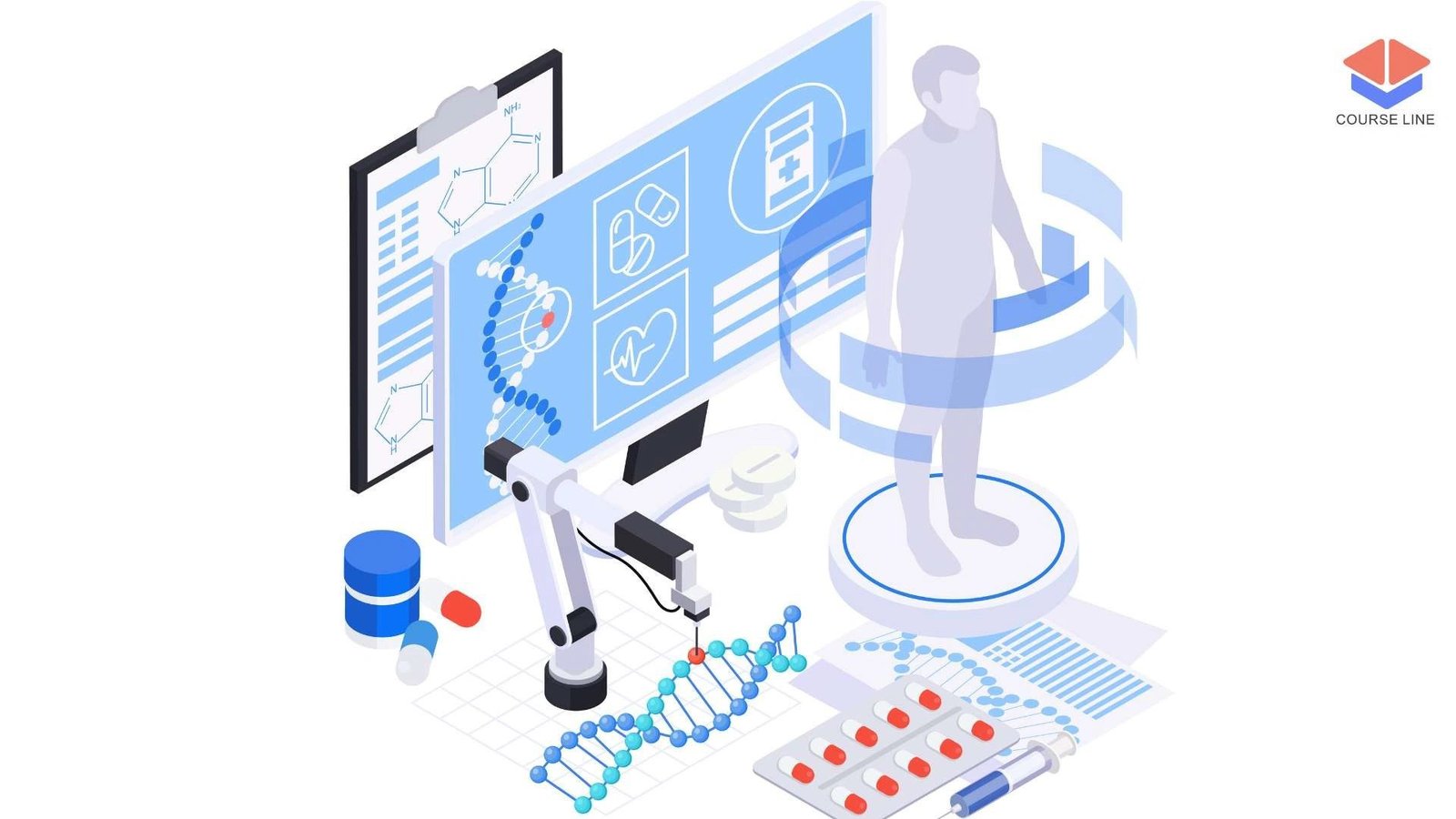Course Features
Price
Study Method
Online | Self-paced
Course Format
Reading Material - PDF, article
Duration
13 hours, 45 minutes
Qualification
No formal qualification
Certificate
At completion
Additional info
Coming soon
- Share
Overview
Biotechnology has significantly advanced the field of therapeutics, particularly through the development and application of antibodies. The "Biotechnology Breakthroughs: Antibodies in Modern Therapeutics" course delves deep into the structure, function, and engineering of antibodies, equipping students with both foundational knowledge and an understanding of cutting-edge biotechnological innovations. The curriculum starts with an introduction to immunoglobulin structures, exploring their functional components, light and heavy chains, complementarity determining regions (CDRs), and biological activities across different antibody classes.
Learners will also gain a solid understanding of immunogenetics, including gene organisation, VDJ recombination, and mechanisms responsible for generating antibody diversity. With lectures on antibody gene expression, class switching, allelic exclusion, and transcriptional regulation, this course provides a full picture of the molecular processes involved in antibody production and functionality.
A significant portion of the course focuses on antibody-based therapies, such as polyclonal and monoclonal antibodies, hybridoma technology, and antibody engineering, including chimeric, humanised, and fully human monoclonal antibodies. You will also explore the development and use of immunotoxins, abzymes, bispecific antibodies, and the differences between passive immunisation strategies like plasma therapy and active immunisation through vaccination. The course concludes with timely modules on COVID-19-related therapies, offering insights into convalescent plasma therapy and monoclonal antibody applications in combating SARS-CoV-2.
Who is this course for?
Biotechnology has significantly advanced the field of therapeutics, particularly through the development and application of antibodies. The "Biotechnology Breakthroughs: Antibodies in Modern Therapeutics" course delves deep into the structure, function, and engineering of antibodies, equipping students with both foundational knowledge and an understanding of cutting-edge biotechnological innovations. The curriculum starts with an introduction to immunoglobulin structures, exploring their functional components, light and heavy chains, complementarity determining regions (CDRs), and biological activities across different antibody classes.
Learners will also gain a solid understanding of immunogenetics, including gene organisation, VDJ recombination, and mechanisms responsible for generating antibody diversity. With lectures on antibody gene expression, class switching, allelic exclusion, and transcriptional regulation, this course provides a full picture of the molecular processes involved in antibody production and functionality.
A significant portion of the course focuses on antibody-based therapies, such as polyclonal and monoclonal antibodies, hybridoma technology, and antibody engineering, including chimeric, humanised, and fully human monoclonal antibodies. You will also explore the development and use of immunotoxins, abzymes, bispecific antibodies, and the differences between passive immunisation strategies like plasma therapy and active immunisation through vaccination. The course concludes with timely modules on COVID-19-related therapies, offering insights into convalescent plasma therapy and monoclonal antibody applications in combating SARS-CoV-2.
Requirements
Biotechnology has significantly advanced the field of therapeutics, particularly through the development and application of antibodies. The "Biotechnology Breakthroughs: Antibodies in Modern Therapeutics" course delves deep into the structure, function, and engineering of antibodies, equipping students with both foundational knowledge and an understanding of cutting-edge biotechnological innovations. The curriculum starts with an introduction to immunoglobulin structures, exploring their functional components, light and heavy chains, complementarity determining regions (CDRs), and biological activities across different antibody classes.
Learners will also gain a solid understanding of immunogenetics, including gene organisation, VDJ recombination, and mechanisms responsible for generating antibody diversity. With lectures on antibody gene expression, class switching, allelic exclusion, and transcriptional regulation, this course provides a full picture of the molecular processes involved in antibody production and functionality.
A significant portion of the course focuses on antibody-based therapies, such as polyclonal and monoclonal antibodies, hybridoma technology, and antibody engineering, including chimeric, humanised, and fully human monoclonal antibodies. You will also explore the development and use of immunotoxins, abzymes, bispecific antibodies, and the differences between passive immunisation strategies like plasma therapy and active immunisation through vaccination. The course concludes with timely modules on COVID-19-related therapies, offering insights into convalescent plasma therapy and monoclonal antibody applications in combating SARS-CoV-2.
Career path
Biotechnology has significantly advanced the field of therapeutics, particularly through the development and application of antibodies. The "Biotechnology Breakthroughs: Antibodies in Modern Therapeutics" course delves deep into the structure, function, and engineering of antibodies, equipping students with both foundational knowledge and an understanding of cutting-edge biotechnological innovations. The curriculum starts with an introduction to immunoglobulin structures, exploring their functional components, light and heavy chains, complementarity determining regions (CDRs), and biological activities across different antibody classes.
Learners will also gain a solid understanding of immunogenetics, including gene organisation, VDJ recombination, and mechanisms responsible for generating antibody diversity. With lectures on antibody gene expression, class switching, allelic exclusion, and transcriptional regulation, this course provides a full picture of the molecular processes involved in antibody production and functionality.
A significant portion of the course focuses on antibody-based therapies, such as polyclonal and monoclonal antibodies, hybridoma technology, and antibody engineering, including chimeric, humanised, and fully human monoclonal antibodies. You will also explore the development and use of immunotoxins, abzymes, bispecific antibodies, and the differences between passive immunisation strategies like plasma therapy and active immunisation through vaccination. The course concludes with timely modules on COVID-19-related therapies, offering insights into convalescent plasma therapy and monoclonal antibody applications in combating SARS-CoV-2.
-
- Introduction 00:10:00
-
- Basic structure of immunoglobulins or antibodies 00:10:00
- Functional components of Antibodies 00:10:00
- Summary Basic structure of antibodies 00:10:00
- Antibody sequencing to know different types of light and heavy 00:10:00
- Types of light chains 00:10:00
- Types of heavy chains 00:10:00
- Immunoglobulin Domains 00:10:00
- Complementarity determining regions CDRs 00:10:00
- Framework region 00:10:00
- Binding of antigen to CDRs 00:10:00
- Role of Hinge Region 00:10:00
- Summary Detailed structure of antibodies 00:10:00
- Introduction to complement system 00:10:00
- Nomenclature of complement proteins 00:10:00
- Classical pathway of complement activation 00:10:00
- Alternative pathway of complement activation 00:10:00
- Lectin Pathway of complement activation 00:10:00
- Membrane Attack Complex MAC 00:10:00
- Summary Complement system 00:10:00
- Regulation of the complement system 00:10:00
- Other functions of complement proteins 00:10:00
- Mechanism of variable region DNA rearrangements 00:10:00
- Class switching 00:10:00
- Mechanism of class switching 00:10:00
- Factors that govern class switching 00:10:00
- Regulatory sequences in DNA 00:10:00
- Allelic exclusion 00:10:00
- Mechanism of allelic exclusion 00:10:00
- Polyclonal Antibodies 00:10:00
- Monoclonal Antibodies 00:10:00
- Hybridoma Technology Production of Monoclonal Antibodies 00:10:00
- Selection of Hybridoma cells producing Monoclonal Antibodies 00:10:00
- Immunotoxins 00:10:00
- Recombinant Immunotoxins 00:10:00
- Humanised and Fully Human Immunotoxins 00:10:00
- Bispecific Antibodies or Heteroconjugates 00:10:00
- Abzymes 00:10:00
- Monoclonal antibodies and COVID19 00:10:00
- Isolation of monoclonal antibodies from COVID19 recovered patients 00:10:00
- How plasma therapy & monoclonal antibody therapy are different from 00:10:00
- Premium Certificate 00:15:00

No Reviews found for this course.
Is this certificate recognized?
Yes, our premium certificate and transcript are widely recognized and accepted by embassies worldwide, particularly by the UK embassy. This adds credibility to your qualification and enhances its value for professional and academic purposes.
I am a beginner. Is this course suitable for me?
Yes, this course is designed for learners of all levels, including beginners. The content is structured to provide step-by-step guidance, ensuring that even those with no prior experience can follow along and gain valuable knowledge.
I am a professional. Is this course suitable for me?
Yes, professionals will also benefit from this course. It covers advanced concepts, practical applications, and industry insights that can help enhance existing skills and knowledge. Whether you are looking to refine your expertise or expand your qualifications, this course provides valuable learning.
Does this course have an expiry date?
No, you have lifetime access to the course. Once enrolled, you can revisit the materials at any time as long as the course remains available. Additionally, we regularly update our content to ensure it stays relevant and up to date.
How do I claim my free certificate?
I trust you’re in good health. Your free certificate can be located in the Achievement section. The option to purchase a CPD certificate is available but entirely optional, and you may choose to skip it. Please be aware that it’s crucial to click the “Complete” button to ensure the certificate is generated, as this process is entirely automated.
Does this course have assessments and assignments?
Yes, the course includes both assessments and assignments. Your final marks will be determined by a combination of 20% from assignments and 80% from assessments. These evaluations are designed to test your understanding and ensure you have grasped the key concepts effectively.
Is this course accredited?
We are a recognized course provider with CPD, UKRLP, and AOHT membership. The logos of these accreditation bodies will be featured on your premium certificate and transcript, ensuring credibility and professional recognition.
Will I receive a certificate upon completion?
Yes, you will receive a free digital certificate automatically once you complete the course. If you would like a premium CPD-accredited certificate, either in digital or physical format, you can upgrade for a small fee.
Course Features
Price
Study Method
Online | Self-paced
Course Format
Reading Material - PDF, article
Duration
13 hours, 45 minutes
Qualification
No formal qualification
Certificate
At completion
Additional info
Coming soon
- Share
Plant Pathology Research and Management
Course Line237£490.00Original price was: £490.00.£14.99Current price is: £14.99.Estate Agent: Success Blueprint Sales, Lettings, and Tech-Driven Strategies
Course Line239£490.00Original price was: £490.00.£14.99Current price is: £14.99.Veterinary Nursing
Course Line237£490.00Original price was: £490.00.£14.99Current price is: £14.99.




